|
Printables |
PowerPoints |
Online exercises |
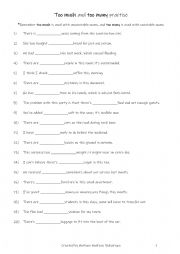
|
Too much and too many practise
Too much and too many practise
Students read the sentences and work out if the sentence needs to be completed with too much or too many.
*Remember too much is used with uncountable nouns, and too many is used with countable nouns
Level: elementary
Age: 10-100
Type:
Downloads: 106
|
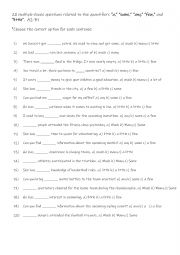
|
Quantifiers practise using a, some, any, few, and little.
20 multiple-choice questions related to the quantifiers a,some,any, few,and little. A2-B1.Answers on page 2
Level: elementary
Age: 10-100
Type: worksheet
Downloads: 106
|
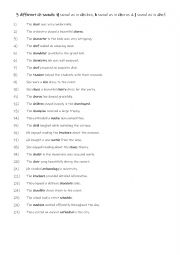
|
3 different ch sounds: tʃ sound as in chicken, k sound as in chorus & ʃ sound as in chef.
Students read the word in bold aloud to work out what sound the Ch makes. They then write the phonemic letter at the end of the sentence. Answers on page 2
Level: elementary
Age: 10-100
Type:
Downloads: 106
|
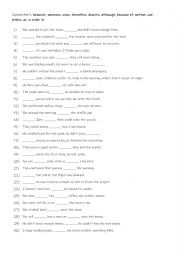
|
B1-B2 10 Connectors: however, whereas, since, therefore, despite, although, because of, neither...nor, either...or, in order to
Connectors help students link ideas, phrases, and clauses together in a logical way. This creates more complex and sophisticated sentence structures, which are essential for advanced writing and speaking.In formal writing and speaking, the use of connectors is a marker of polished and professional language. They help you present information logical...
Level: intermediate
Age: 12-100
Type:
Downloads: 106
|
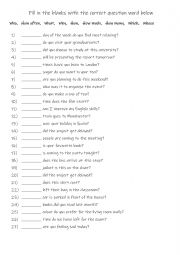
|
A1 Fill in the blanks with the correct question word below
Students familiarise themselves with the question words in bold, then read the sentences to see which interrogative is needed to complete the question. Answers on page 2.
Level: elementary
Age: 8-100
Type:
Downloads: 106
|
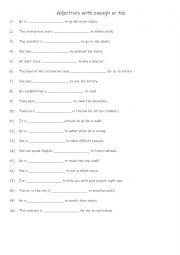
|
A2-B1 Adjectives with enough or too 3
Students read the sentences and using a suitable adjective they complete the sentences using either enough / too. Answers on page 2.
Level: intermediate
Age: 7-100
Type:
Downloads: 106
|
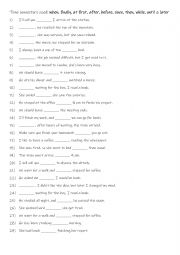
|
A2+-B1 Time connectors used: when, finally, at first, after, before, since, then, while, until & later
Time connectors help students organise their thoughts and present them in a clear, logical sequence. They show the relationship between events and actions in time, making communication easier to follow. Using these connectors correctly improves fluency in both speaking and writing. They allow people to describe actions in relation to each other, w...
Level: intermediate
Age: 8-100
Type:
Downloads: 106
|
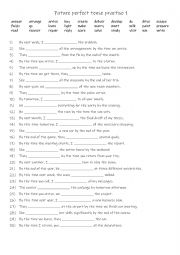
|
B1 Future perfect tense practise 1
Students need to learn the future perfect tense because it allows them to express actions that will be completed at a specific time in the future. This tense helps convey a sense of timing and completion, making it useful for discussing goals, predictions, and plans. Mastering the future perfect tense also improves overall fluency by providing stud...
Level: intermediate
Age: 9-100
Type:
Downloads: 106
|
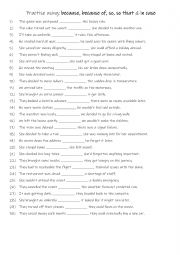
|
A2-B1 Practise using: because, because of, so, so that & in case 1
Learning to use "because," "because of," "so," "so that," and "in case" helps improve clarity and precision in communication. These phrases allow you to explain reasons ("because," "because of"), show results ("so"), indicate purpose ("so that"), and talk about future possibilities ("in case"). Mastering these structures enhances your ability to pr...
Level: elementary
Age: 8-100
Type:
Downloads: 106
|
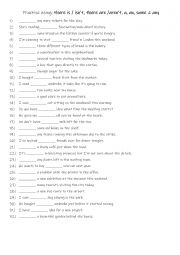
|
A1+-A2 Articles and quantifiers Practise using there is / isn�t, there are / aren�t, a, an, some & any
Learning the structures "there is / isn�t", "there are / aren�t", "a / an", "some", and "any" is essential for clear communication in English. They help students describe the existence or absence of things, specify quantities, and form both positive and negative sentences. "A" and "an" are used for singular, countable nouns, while "some" and "a...
Level: elementary
Age: 8-100
Type:
Downloads: 106
|
|
|
|
|












